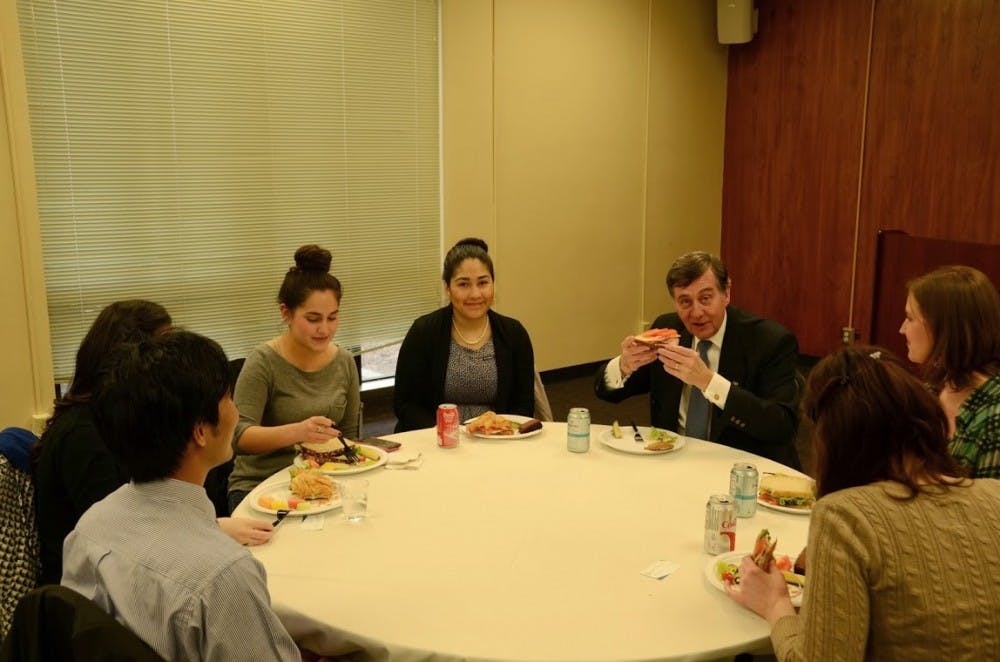Maggie Smet |
Students welcomed two former congressmen this week to discuss their time in the House of Representatives and political issues with students, faculty and staff.
Students in diverse fields, from political science to environmental studies to education, had a chance to meet with former Reps. Gil Gutknecht (R-Minnesota) and Martin Lancaster (D-North Carolina). On Feb. 24 in the Bauccio Commons, the UP community gathered for a Q-and-A session, focusing mainly on the current state of Congress, how it has changed and the role it plays in American life.
Gutknecht compared his time in the House of Representatives to his time in the Minnesota state legislature, and spoke of the differences in debate between the two. According to him, there is a lack of debate in Congress.
“Essentially, what happens in Congress is members just get up and read speeches, unfortunately very often written by their staffs, and there isn’t the give and take,” Gutknecht said. “Members are seldom persuaded by the debate on the floor of the House. In fact, members rarely even listen to the debate that’s going on in the floor of the House.”
Both former congressmen spoke with dismay over the loss of collegiality and bipartisanship they see in today’s politics, and blamed the lack of opportunities for representatives across the aisle to get to know each other.
“There’s very little opportunity for members of Congress to get to know each other on a personal level,” Lancaster said. “There’s less fact-finding trips when members of both parties can get to know each other. There’s just a different atmosphere now.”
Senior Leah Becker asked the congressmen to speak about the lack of women, and how it can be improved.
“Find stronger women. We win with the people who show up, we need to find good candidates who will set up and run,” Gutknecht responded. “There are some good backbenchers on both sides of the political aisle today … There are some pretty strong women in politics today that you will see coming and I think will be stepping up in a few years.”
After the event, Becker was still mulling over Gutknecht’s response before she and the German Culture Club met with both congressmen.
“I was frustrated that their answer was to find strong women when we clearly have strong women continually running who aren’t being voted in and are harshly being depicted in the media, and I was a little frustrated that that wasn’t addressed or maybe even not known by (former congressman) Gutknecht,” Becker said.
Junior Josh Cleary questioned Gutknecht and Lancaster about the importance of civics education, and whether it should be emphasized in the education system from elementary school through grade school.
Lancaster said he views civics education as very important, and mentioned the law in North Carolina requiring one year of civics education for students.
Gutknecht mentioned his own experience of having good social studies teachers. He also highlighted the importance of morality education. He spoke of his dismay at Catholic schools not teaching his own children what he believed should be taught in terms of morality.
“If I were to say anything, now I paid a lot of money in tuition to various schools for my kids. I can say I’m embarrassed to say how little they learned that I thought they needed to learn about morality,” said Gutknecht. “For example, and I asked some classes earlier today (at UP). Even in parochial schools, they don’t teach the Seven Deadly Sins anymore. They don’t teach a lot of the things that we were taught growing up. They’re Seven Deadly Sins because they are deadly. They’re not seven kind of mistakes. I think kids need to understand that.”
Political science professor Gary Malecha closed the event by asking a question he’s always wondered about, concerning the controversial relationship between the House of Representatives and the Senate.
“How do the folks in the in the House of Representatives feel about the Senate?” Malecha said, meeting some laughter from the audience.
“There’s always been, in my belief, (the feeling) that the enemy was not the other party, but the other body,” Lancaster said. “It’s just a natural fact of political life that the House and Senate just don’t get along. It’s been true back through my legislative career, so for the last 20-plus years, there’s been incredible tension between the House and the Senate.”
Some students were glad to have the chance to discuss political issues with people who have served in political positions.
“It’s so rare that university students get to talk to people who have been in government,” Cleary said. “It’s a great opportunity.”








